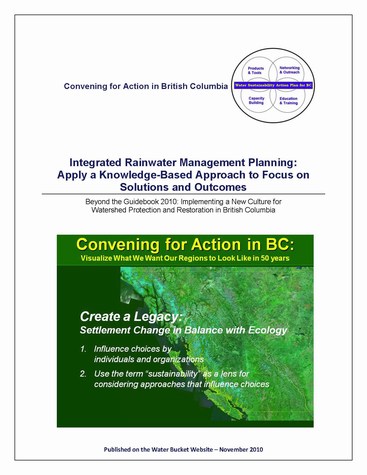Story #3 in the ISMP Course Correction Series: Apply a Knowledge-Based Approach to Focus on Solutions and Outcomes
Note to Readers:
This article is an extract from the third in a series of five stories that are designed to inform local governments and others about a course correction for Integrated Stormwater Management Plans (ISMPs). Story #3:
- clarifies the objectives in making the change to Integrated RAINwater Management Plan (IRMP) from ISMP;
- introduces the knowledge-based approach to making decisions; and
- highlights the ‘learnings’ by those who are demonstrating leadership in establishing outcome-oriented precedents for watershed protection through green infrastructure.
“ The Bowker Creek Initiative in the Capital Region, the City of Surrey’s watershed objectives approach, and the District of North Vancouver’s vision for watershed landscape restoration are showcased in Story #3. these three are demonstrating how to implement a new way of doing business, one that is founded on aligning efforts and collaborating as a team,” states John McMahon, Chair of Metro Vancouver’s Stormwater Interagency Liaison Group.
The Bowker Creek Initiative in the Capital Region, the City of Surrey’s watershed objectives approach, and the District of North Vancouver’s vision for watershed landscape restoration are showcased in Story #3. these three are demonstrating how to implement a new way of doing business, one that is founded on aligning efforts and collaborating as a team,” states John McMahon, Chair of Metro Vancouver’s Stormwater Interagency Liaison Group.
To download a PDF version of the complete Story #3, click on Integrated Rainwater Management Planning: Apply a Knowledge-Based Approach to Focus on Solutions and Outcomes
Regional Team Context for IRMPs
The purpose in publishing the “ISMP Course Correction Series” is to draw attention to lessons learned, and insights gained, by local government leaders who have ISMP and/or related, relevant experience. The spotlight is on aligning efforts in the local government setting to implement effective green infrastructure. Thus, the objectives in correcting from ISMPs to IRMPs are three-fold:
- Re-focus on stream health outcomes
- Utilize land use regulatory tools
- Build-in resilience to adapt to climate change
Sharing experience and pooling limited resources will enable local governments to ‘do more with less’, especially if they embrace the ‘regional team approach’ to doing business differently.
Apply a Knowledge-Based Approach
A decade ago, the Regional District of Nanaimo (RDN) partnered with the Province to develop case study content for Stormwater Planning: A Guidebook for British Columbia. The RDN contributed a Knowledge-Based Approach to setting watershed priorities. This pilot application, incorporated as Chapter 5 in the Guidebook, resulted in a pragmatic methodology that focuses on outcomes, by getting the right people together.
A decade later, the Bowker Creek Blueprint in the Capital Regional District (CRD) has demonstrated the effectiveness of the approach. The RDN and CRD experiences show that when the right people with the right knowledge are involved in a collaborative process, a knowledge-based approach to watershed protection and restoration will be both time-efficient and cost-effective.
To Learn More:
Local government experience in Metro Vancouver and on Vancouver Island has informed the ‘ISMP course correction’ described in Beyond the Guidebook 2010: Implementing a New Culture for Watershed Protection and Restoration in British Columbia. Readers are encouraged to:
- Download and read the complete Story #3 by clicking on this link to Integrated Rainwater Management Planning: Apply a Knowledge-Based Approach to Focus on Solutions and Outcomes
- Access the other stories in ‘ISMP Course Correction Series’ by clicking on Water Bucket publishes excerpts from “Beyond the Guidebook 2010” about why and how to re-focus ISMPs on outcomes — Outcome-oriented planning is a problem-solving PROCESS. It is not a procedure. It is not a matter of applying a regulation or a checklist. Participants have to be committed to the outcome.
- For more information on the Knowledge-Based Approach as presented in the Guidebook, click on the following link to download Chapter 5 – Setting Priorities for Early Action
As part of the “ISMP Course Correction”, the time has come to describe truly integrated plans as “IRMPs” to reflect the paradigm-shift to landscape-based ‘RAINwater’ from pipe-and-convey ‘stormwater’. A holistic IRMP is a potentially powerful tool to achieve a vision for ‘green’ infrastructure, one that protects stream health, fish habitat and fish; and one that anticipates climate change.

Posted November 2010


